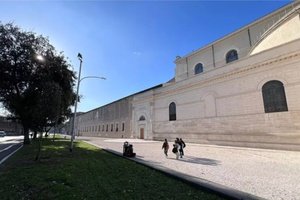Mark Nicholls, a professor of Cinema Studies at the University of Melbourne, has always had a particular interest in Italian cinema, as well as non-Italian directors who work with themes relating to the Bel Paese.
The professor, who is also a film critic, journalist and author, began his love affair with Italy at a young age, studying Latin and other classical subjects.
“When I was around 14 years old, I took a trip to Italy and I was very impressed,” Nicholls said.
“Italy’s influence on the history of cinema has been profound, especially from World War II onwards.
“The entire neorealist period and emerging cinema up until the 1970s were heavily shaped by Italian filmmakers.
“Antonioni, Rossellini, Bertolucci and Pasolini were pioneers of Italian cinema, creating masterpieces such as: Roma città aperta (Rome, Open City), Ladri di biciclette (Bicycle Thieves); and I bambini ci guardano (The Children Are Watching Us).
“These titles, together with films including L’avventura (The Adventure), Il conformista (The Conformist) and Otto e mezzo (8 ½), meant so much to me.
“If I had to recommend one film to everyone in particular, it would surely be Il Gattopardo (The Leopard), which is a masterpiece; I would talk about it every week with my students.”
Italian cinema has continued to evolve, with contemporary directors such as Nanni Moretti, Paolo Sorrentino and Luca Guadagnino producing “excellent” films.
Due to their quality and accessibility, films from these directors have attracted audiences both in Italy and around the world, bringing Italian films into the limelight.
Global sensation Call Me by Your Name, nominated for four Oscars, alternates between English, French and Italian in its script.
“Bertolucci and Rossellini had already begun to attempt to address a more global audience, outside of Italy,” Nicholls emphasised.
“Perhaps the defining moment of Italian film’s global trajectory could be attributed to Ingrid Bergman’s desire to work with Roberto Rossellini.”
Bergman was so struck by Rossellini’s vision displayed in Paisà (Paisan) and Roma città aperta (Rome, Open City) that she wrote a letter to the director, pledging to make herself available to work with him.
In recent years, Italian television series have also been met with global acclaim.
“I started doing research on L’amica geniale (My Brilliant Friend) and I think it’s one of the best TV series I’ve ever seen,” Nicholls said.
Though new methods of distribution, such as streaming services, have made it easier for viewers to access a wealth of titles, they have their own pitfalls.
“Online distribution platforms have, in some cases, deprived filmmakers of freedom of expression,” Nicholls explained.
“This can happen when these streaming services, which also act as production houses, influence the creativity and content of directors, which is why some filmmakers refuse to work with them.
“This in turn makes it difficult for viewers to find and access their films, which is a real shame.”
Nicholls, who had edited a column in The Age for many years, argues that the role of the film critic should be to “create an imaginary bridge between the director and the audience, so that viewers can understand the difficulties and level of skill required in the production of a film”.
Though social media is a valuable marketing tool for disseminating promotional material for films, it too is a double-edged sword, as many productions have been shut down due to online backlash.












